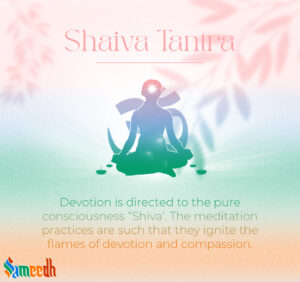Shaiva Tantras are a collection of scriptures within the broader category of Hindu Tantra dedicated to the worship of Lord Shiv, one of the principal deities of Hinduism. These texts lay down the philosophical, theological, ritualistic, and meditative aspects of Shaivism, the tradition centered on the worship of Shiv.

Shaiva Tantras include numerous texts, each with its own focus and teachings. Some of the major Shaiva Tantras include the Rudrayamala Tantra, the Vijnana Bhairava Tantra, the Shiv Sutras, and the Kamika Agama. These texts vary in their complexity, symbolism, and emphasis on different aspects of Shaivism.
Shaiva Tantras present a unique philosophical perspective within Hinduism, emphasizing the concepts of Shiv as the Supreme Being, the unity of the individual soul (Atman) with the universal consciousness (Brahman), and the inseparable relationship between Shiv and Shakti (the divine feminine energy). They also expound upon the concepts of creation, preservation, and dissolution of the universe.
Shaiva Tantras prescribe a wide range of rituals, ceremonies, and practices for the worship of Shiv and attainment of spiritual goals. These may include daily puja (worship), meditation, mantra recitation, yantra worship (the use of geometric diagrams), and various forms of yoga, including hatha yoga and kundalini yoga.
Shaiva Tantras place significant emphasis on the use of sacred sounds (mantras) and symbolic diagrams (yantras) as powerful tools for spiritual transformation and realization. Mantras are chanted to invoke the divine presence of Shiv, while yantras are used as aids for meditation and concentration.
Shaiva Tantras often require initiation (diksha) from a qualified guru (spiritual teacher) for practitioners to engage in the advanced practices outlined in the texts. Initiation typically involves receiving a specific mantra, instructions on ritual worship, and guidance on meditation techniques.
Within Shaiva Tantra, there is a distinction between Kaula Tantras and non-Kaula Tantras. Kaula Tantras, also known as Left-Hand Path Tantra, incorporate more esoteric practices, including the use of taboo substances and sexual rituals, aimed at rapid spiritual advancement. Non-Kaula Tantras, on the other hand, focus on more orthodox forms of worship and spiritual practice.
Over the centuries, various Shaiva lineages and traditions have emerged, each with its own interpretations of Shaiva Tantra and practices. These include Kashmir Shaivism, Natha Sampradaya, and Shaiva Siddhanta, among others.
Overall, Shaiva Tantras play a significant role in shaping the beliefs, rituals, and spiritual practices of Shaivites, offering a comprehensive framework for seekers to connect with the divine presence of Lord Shiv and attain spiritual liberation